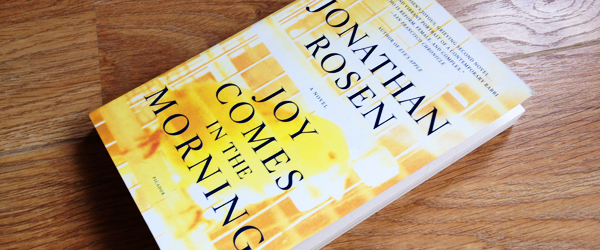Book Club: Joy Comes in the Morning

On Sunday, April 30, 2017 at 10:00am, our Book Club meets to discuss Joy Comes in the Morning, by Jonathan Rosen Buy this book on Amazon and donate to BCC! more details
Deborah Green is a woman of passionate contradictions–a rabbi who craves goodness and surety while wrestling with her own desires and with the sorrow and pain she sees around her. Her life changes when she visits the hospital room of Henry Friedman, an older man who has attempted suicide. His parents were murdered in the Holocaust when he was a child, and all his life he’s struggled with difficult questions. Deborah’s encounter with Henry and his family draws her into a world of tragedy, frailty, love, and, finally, hope.
People of the Word
The promise of the Talmud, Jonathan Rosen asserted in his quirky but moving meditation “The Talmud and the Internet,” “is that it isn’t a book — it’s a sort of drift net for catching God.” We might say a similar thing about his new novel, “Joy Comes in the Morning,” which is as much an inquiry into faith as anything else: faith in one’s traditions, faith in each other, faith in life. And what a pleasure it is to see such a serious and yet playful novel in this hot-button time for religion, when Christian and Muslim identities are domestic political chaff and Christian end-time novels are a publishing phenomenon.
Not since E.L. Doctorow’s “City of God” have we seen such a literary effort to plumb the nature of belief — in Jewish-American culture, in Talmudic study, in prayer, in sexual relations, in the very soundness of one’s own mind. Many of the religious and life motifs that Rosen braided together in “The Talmud and the Internet” are to be found here in a fictional frame, and perhaps he simply followed the advice of the Talmudic sage Ben Bag Bag, who said “Turn it and turn it for everything is in it.”
The title of Rosen’s novel is taken from a memoir that one of its main characters, Henry Friedman, has worked on unsuccessfully for years. Friedman, patriarch of the family at the center of the book, lifted it from Psalm 30 (“Weeping may endure for a night, / but joy comes in the morning”). As promisingly restorative as that concept might be, Henry has concluded it is bunk. As we meet him near the book’s opening, he is frustrated with the aftereffects of a stroke, fearful of suffering more, and elaborately preparing his suicide.
Continue reading in the New York Times




